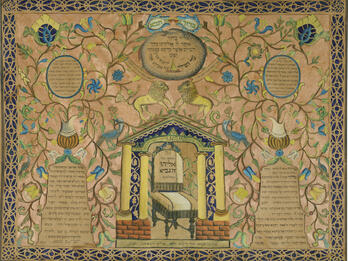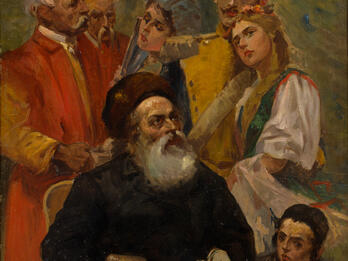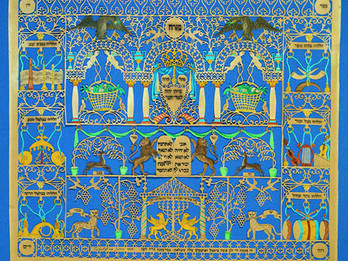Showing Results 1 - 7 of 7
Restricted
Image
Paper cuts have been a tradition of Jewish folk art, with the earliest record of one dating to the fourteenth century. Given the widespread availability of paper in Europe by the mid-nineteenth…
Contributor:
Nachman ha-Kohen Bialsker
Places:
Bielsk, Russian Empire (Bielsk Podlaski, Poland)
Date:
1862
Subjects:
Categories:
Restricted
Image
Jankiel’s Concert was inspired by a scene from Pan Tadeusz, Adam Mickiewicz’s 1834 epic poem, considered the national poem of Poland. The character of Jankiel, the Jewish innkeeper, is the most…
Contributor:
Maurycy Trębacz
Places:
Warsaw, Russian Empire (Warsaw, Poland)
Date:
1900
Categories:
Restricted
Image
Paper cuts have been a tradition of Jewish folk art, with the earliest record of one dating to the fourteenth century. Given the widespread availability of paper in Europe by the mid-nineteenth…
Contributor:
Moses Michael Rosenboim
Places:
Schönlanke, Kingdom of Prussia (Trzcianka, Poland)
Date:
1848
Subjects:
Categories:
Restricted
Text
It is a work that contains two hundred precious and wondrous stories, full of ethical [edification] and [inspiring] fear of the Lord, sweeter than honey, bringing joy to oppressed hearts and souls…
Contributor:
Yitsḥak Dov Ber ben Tsvi Hirsh
Places:
Russian Empire (Poland, Poland)
Date:
1900
Restricted
Text
Sensitive Content
Great men were once able to perform great miracles.
When the ghetto of Prague was under attack and marauders wanted to rape the women, roast the children, and murder everyone, when it seemed that all…
Contributor:
Y. L. Peretz
Places:
Warsaw, Russian Empire (Warsaw, Poland)
Date:
1893
Subjects:
Categories:
Restricted
Text
Once upon a time the tsadik Rebbe Levi Yitsḥak of Berditshev was in the city of Polonnoye, and an acquaintance approached him. He [the acquaintance] was an extremely poor man, with three sons and two…
Contributor:
Aaron Zeilingold
Places:
Warsaw, Russian Empire (Warsaw, Poland)
Date:
1911
Categories:
Restricted
Text
Now in that same shtetl there lived a youth named Shimen, but he was nicknamed Simkhe (joy, celebration) and Plakhte (coarse cloth) because he was barefoot and almost naked and that was all he wore…
Contributor:
Yankev Morgenshtern
Places:
Lodz, Russian Empire (Lodz, Poland)
Date:
1870s or 1880s





